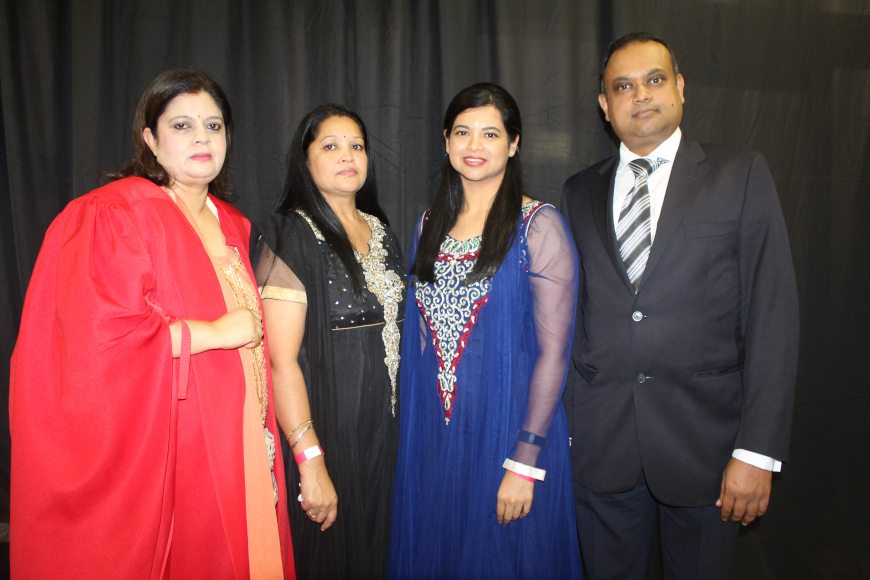It was mixed emotions of happiness and sadness for family, friends and colleagues of the late Pradeep Ashokcoomar, when he was conferred with his PhD (posthumous) in Emergency Medical Care within the Faculty of Health Sciences this afternoon (Tuesday 14 May 2019) at the Fred Crookes Sports Centre, Steve Biko Campus in Durban.
The title of his thesis was: ‘Inter – Healthcare Facility Transfer of Critically Ill Neonates: The Development of a Programme for Emergency Medical Care in South African context’. Ashokcoomar passed away in January 2019.
His brother Ryan Dukhi described him as a tough, committed and intelligent person whose zest for life was second to none. “He was a vibrant and happy person, despite adversities. However, he had a serious side when it came to emergency medical care and helping people in general,” he said.
Dukhi said even though Ashokcoomar is no longer around to witness his great moment (graduation), but his family is very proud of his achievement. “Pradeep was a dedicated and hard working person. Although he is not here to celebrate his amazing achievement, the honour bestowed on him makes his family even prouder of him than we already are,” he said.
Ashokcoomar’s PhD thesis Supervisor, Professor Raisuyah Bhagwan described him as someone who was very passionate about people and saving lives. “His work as a paramedic made him more aware of the crucial role paramedics played in saving lives. During his journey as an advanced life paramedic he became more aware that critically ill premature babies or neonates were dying due to multiple factors that could have been avoided during their transfer from one hospital to another for specialised care,” she said.
“This prompted a study that would interrogate all aspects of the transfer process, the infrastructure, the difficulties of ground and air transport in a developing country and the preparedness of paramedics to deal with neonatal clinical emergencies. He was inspired by his love for these babies who he had to transfer under strenuous circumstances…he was inspired by his colleagues and the difficulties they faced during air and road transport to transfer and save critically ill neonates. More importantly was his sensitivity towards the fact that new mothers were overlooked during the transfer,” she added.
Among some of the key findings from Ashokcoomar’s six – year study, he discovered that neonatal transfer system in South Africa is in a very poor state. It lacks specialised transport vehicles and specialised equipment to save fragile babies, the transfer process is beset with a range of communication difficulties which also jeopardises the way the transfer of critically ill neonates is co – ordinated. Most importantly the study highlights that paramedics lack educational preparedness and training to deal with various neonatal clinical emergencies.
Prof Bhagwan added that by interviewing neonatologists, paramedics and emergency care academics, Pradeep was able to identify what was needed at multiple levels in order to effect a safer transfer. “Most importantly the study heard through the voices of the mothers of these neonates the trauma endured when their babies are transferred to another hospital. Often they are unprepared for this, are recovering from having just given birth and have to endure watching their fragile neonate being transferred for specialised care. Mothers said that even when they accompanied their babies their health issues were overlooked in the ambulance, as the focus was on keeping the critically ill neonate alive,” she said.
She said the study has immense value for neonatal transfers in a developing country like South Africa. Adding that the focus of the study was to develop a multi-faceted programme that would guide the implementation of a new neonatal transfer system in South Africa.
“It identified the infrastructure required to effect safer transfers, the requisite equipment needed but more importantly the unique skills required by paramedics to deal with various neonatal clinical emergencies. The study recommended the need for a separate module which specifically identifies the knowledge and skills required by paramedics to deal with neonatal clinical emergencies,” Prof Bhagwan said.
She said this is the hardest moment of her academic career because she knows the adversities that Ashokcoomar had to endure in order to achieve his PhD. “I had to shift my role from supervisor to that of ‘friend’, I had to bear witness to his tremendous pain and suffering, whilst having to comfort him and give him the strength to complete the changes needed for him to pass. I was in a desperate bid for time, hoping that he would make graduation as he always shared with me how he was looking forward to this moment (graduation). I am comforted by the legacy he has left behind through his work as it will go a long way to overhauling the transfer neonatal system in SA,” she added.
Pictured: Pradeep Ashokcoomar’s family after receiving his qualification on his behalf.
Nduduzo Ndlovu

